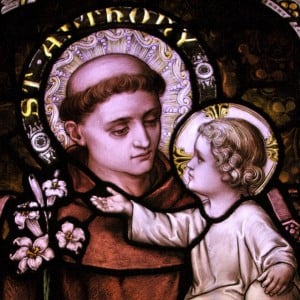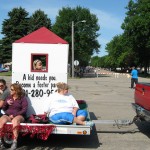This is a guest post by Larry Clow. Larry is a writer and editor living in the NH Seacoast. He’s the editor of The Sound. He’s also hard at work on a forthcoming book about adoption and social media. Follow him on Twitter.
Fifth in a series on adoption and modern Christianity; read more here.
My family lingered after mass. We were first in, last out Catholics — partly because my parents were lay ministers and I was an altar boy, and partly because my parents believed those extra few minutes on either side of the services helped move us up the scoreboard. And because we lingered, we chatted. With Father Jim, our priest; Shirley, the parish secretary, and the gaggle of old ladies who also lingered by virtue of age.
“I swear, when Larry walked down the center aisle, in his white robe and holding the candle, he looked just like a priest,” said Doris, one of the old women, after an Easter vigil mass when I was 12.

“He did,” said Nancy, her friend. “Just like a priest.”
I smiled, though it probably looked more like a grimace, and my parents beamed. “You never know!” my mother said. She cast in my direction a significant glance, suggesting that I consider this banter vocational advice.
“Just like a priest,” Doris said again, making it sound like a prophecy. “He looks so good up there at the altar.”
I was no stranger to predictions like this. It’s part of being adopted. “You’re special because you’re adopted — it means God chose you specifically for us.” My mother told me this as early as I can remember. I knew, too, that my parents had tried for years to have a child, but couldn’t, and that my grandfather, who raised three daughters, desperately wanted a grandson. The subtext was really just text: God sent you here to make our family whole. You’re meant for great things. Don’t mess this up.
Sound familiar? Christianity informs the roots of modern American adoption. It was Charles Loring Brace, a Congregational minister, who started the Orphan Train movement in the mid-19th century, which sent thousands of children from poor neighborhoods in Eastern cities to families in the rural Midwest. The idea was to “save” children from institutional care and place them with farm families. The Orphan Train movement ended in the 1920s, but the ideas behind it formed the basis for modern adoption practices.
And so it’s not surprising that all sorts of savior complexes and religious undercurrents are found in adoption. (As an added bonus, I was adopted through Catholic Charities.) Adoptive parents are encouraged to feel like they’ve “saved” a child from some horrible fate, and adoptees sometimes get cast as their family’s personal savior. Birth/first mothers are either pegged as saintly Marys who made a difficult decision for the good of her child or harlots who, either by choice or force, were relieved of their child.
These myths are messy, damaging stuff (Kathryn Joyce has done some great reporting on adoption and modern evangelical Christianity). Even in the best scenarios, these underpinnings can change how adoptees, biological parents, and adoptive parents think about themselves and each other. It gets even more complicated for transracial adoptees, for whom racism and colonialism gets mixed in with the usual religious baggage.
For me, these attitudes about religion and adoption fully informed my faith — more precisely, my lack of it. My parents and I were the picture of a perfect Catholic family. My father taught a kindergarten Sunday school class, and I helped him prepare lessons. Both he and my mother were lay ministers; I was an altar server. My father was in the Knights of Columbus; I was in the youth group and on the CYO basketball team. We worked church picnics and clean-up days and stayed late after functions to load folding chairs on to massive rolling carts.
But I didn’t believe. I don’t know if I ever did. I went through the motions and played the part, and though I appeared sincere, I wasn’t. (I was, however, sincere about wanting to please my family, so perhaps that’s why my appearance of faith was so convincing.)
I didn’t believe because when I thought about my adoption, I didn’t see God’s hand. I was 10 or 11 when I realized this. For many years, my parents had hanging in the dining room the letter from the Catholic Charities caseworker who approved my adoption. I saw the letter every day, and it told me that there was no prophecy behind my adoption, no destiny, no special plan. Just an accident of bureaucracy. I was there and not somewhere else because of paperwork — not God.
It helped, too, that I was nothing like my family. We didn’t share interests or even similar attitudes. At 10 years old, I could already see how different I was from them, a quiet kid obsessed with books and movies and comic books in a family where no one owned books and everyone slept through movies. My mother and grandfather, the two parental figures who tried hardest to influence me, spoke in shouts and barked orders and distrusted anyone they deemed as too educated (“They just think they’re better than everyone else.”). They viewed god not as a loving figure or creator of awesome power, but as a judgmental scorekeeper who sat in the clouds and kept track of the minutes you spent in church and made special note when you forgot to mail a birthday card or didn’t spend enough time with your family.
It was a perfect mix for inoculating me against belief and religion. If my only choice was a rules-obsessed deity who cared more about my grandfather’s weekly church attendance than the fact he verbally abused everyone else in the family, then I’d believe in nothing except accidents of paperwork and systems that don’t work. And if I didn’t believe, then the prophecies didn’t apply. I didn’t have to save the family or do great things. I could just be myself.
But that’s easier said than done, for me and for many other adoptees. It takes years of work to untangle those knots of belief and expectations and familial obligation. Apart from a handful of weddings and a few funerals, I haven’t been to mass in 17 years. On the rare occasions I see my parents, they ask if I’ve been to church lately. When I say that I haven’t, they reminisce about how nice I looked up at the altar, how the old ladies in the parish fawned over me. I feel for a moment the familiar weight of guilt. Then it’s gone, and I quietly savor its absence.












